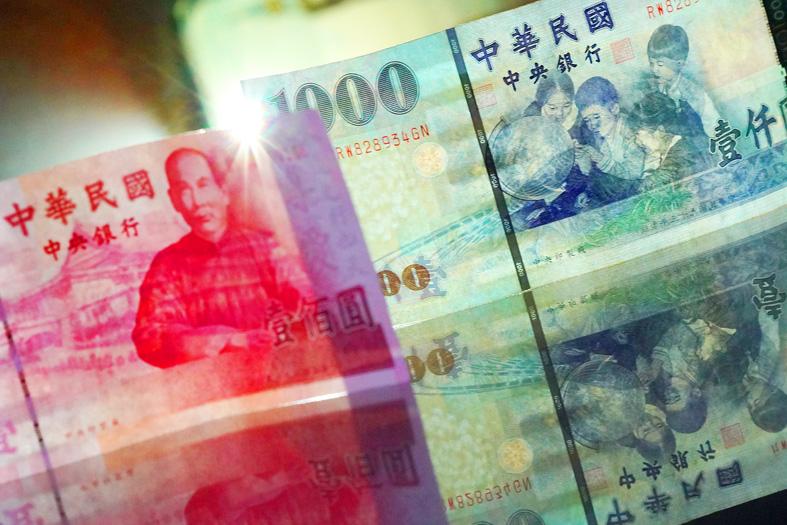Several major lenders have announced plans to raise their interest rates after the central bank surprised the market by raising its key interest rate by 0.25 percentage points to fight inflation.
State-owned Bank of Taiwan (臺灣銀行), the nation’s largest lender, said it would follow suit by today raising its rates for one, two and three-year savings deposits to above 1 percent.
Its benchmark one-year deposit rate would rise to 1.09 percent from 0.84 percent, the bank said, adding that a deposit of NT$1 million (US$35,261) would receive NT$10,900 in annual interest, up by NT$2,500.

Photo: CNA
The rates of its two and three-year deposits would rise by 0.28 percentage points and 0.29 percentage points respectively, exceeding the central bank’s interest rate increase, it said.
Large deposit accounts thus far received relative little interest, so that a steep rate increase would reflect market reality, it said.
Partly state-owned lenders Taiwan Cooperative Bank (合作金庫銀行) and First Commercial Bank (第一銀行) also raised their interest rates, effective today.
Taiwan Cooperative Bank raised the rates for fixed-term deposits by 0.25 percentage points — with rates from 1.065 percent to 1.115 percent for deposits running one to three years.
First Commercial Bank also raised the rates for fixed-term deposits by 0.25 percentage points — to 1.065 percent for one-year deposits, and 1.09 percent for two and three-year deposits.
The highest rate for term deposits at First Commercial Bank would be 1.27 percent, it said.
Home mortgage interest rates are also expected to rise.
CTBC Bank (中國信託銀行) said it would adjust its home mortgage rates on Wednesday at the earliest, while Cathay United Bank (國泰世華銀行) and Taipei Fubon Commercial Bank (台北富邦銀行) said they might adjust their rates as early as next month.
Central bank Governor Yang Chin-long (楊金龍) on Thursday said the rate increase is expected to lead to an average mortgage interest increase of NT$19,075 on a NT$7.63 million mortgage.

SEEKING CLARITY: Washington should not adopt measures that create uncertainties for ‘existing semiconductor investments,’ TSMC said referring to its US$165 billion in the US Taiwan Semiconductor Manufacturing Co (TSMC, 台積電) told the US that any future tariffs on Taiwanese semiconductors could reduce demand for chips and derail its pledge to increase its investment in Arizona. “New import restrictions could jeopardize current US leadership in the competitive technology industry and create uncertainties for many committed semiconductor capital projects in the US, including TSMC Arizona’s significant investment plan in Phoenix,” the chipmaker wrote in a letter to the US Department of Commerce. TSMC issued the warning in response to a solicitation for comments by the department on a possible tariff on semiconductor imports by US President Donald Trump’s

‘FAILED EXPORT CONTROLS’: Jensen Huang said that Washington should maximize the speed of AI diffusion, because not doing so would give competitors an advantage Nvidia Corp cofounder and chief executive officer Jensen Huang (黃仁勳) yesterday criticized the US government’s restrictions on exports of artificial intelligence (AI) chips to China, saying that the policy was a failure and would only spur China to accelerate AI development. The export controls gave China the spirit, motivation and government support to accelerate AI development, Huang told reporters at the Computex trade show in Taipei. The competition in China is already intense, given its strong software capabilities, extensive technology ecosystems and work efficiency, he said. “All in all, the export controls were a failure. The facts would suggest it,” he said. “The US

The government has launched a three-pronged strategy to attract local and international talent, aiming to position Taiwan as a new global hub following Nvidia Corp’s announcement that it has chosen Taipei as the site of its Taiwan headquarters. Nvidia cofounder and CEO Jensen Huang (黃仁勳) on Monday last week announced during his keynote speech at the Computex trade show in Taipei that the Nvidia Constellation, the company’s planned Taiwan headquarters, would be located in the Beitou-Shilin Technology Park (北投士林科技園區) in Taipei. Huang’s decision to establish a base in Taiwan is “primarily due to Taiwan’s talent pool and its strength in the semiconductor

French President Emmanuel Macron has expressed gratitude to Hon Hai Precision Industry Co (鴻海精密) for its plan to invest approximately 250 million euros (US$278 million) in a joint venture in France focused on the semiconductor and space industries. On his official X account on Tuesday, Macron thanked Hon Hai, also known globally as Foxconn Technology Group (富士康科技集團), for its investment projects announced at Choose France, a flagship economic summit held on Monday to attract foreign investment. In the post, Macron included a GIF displaying the national flag of the Republic of China (Taiwan), as he did for other foreign investors, including China-based